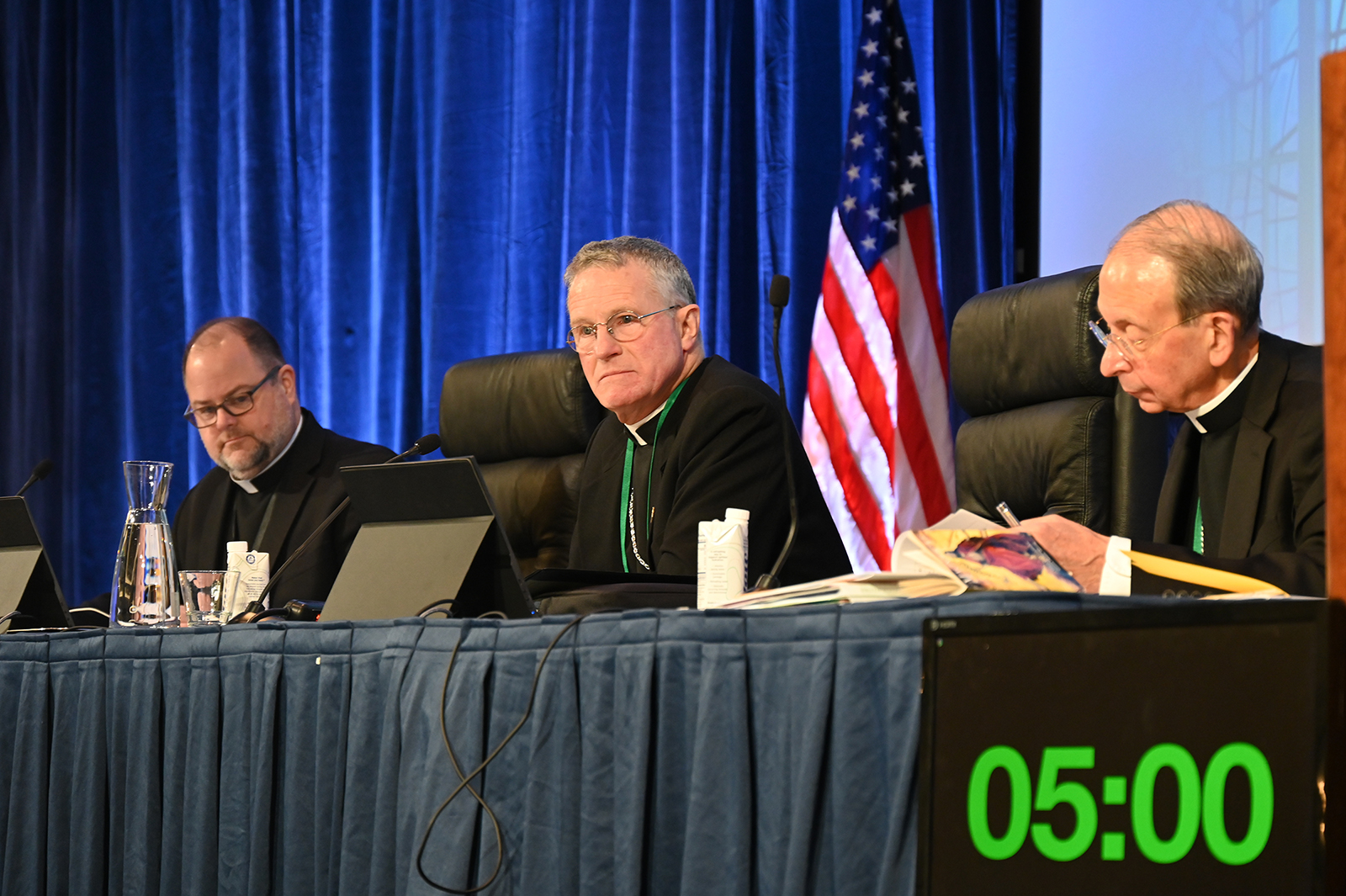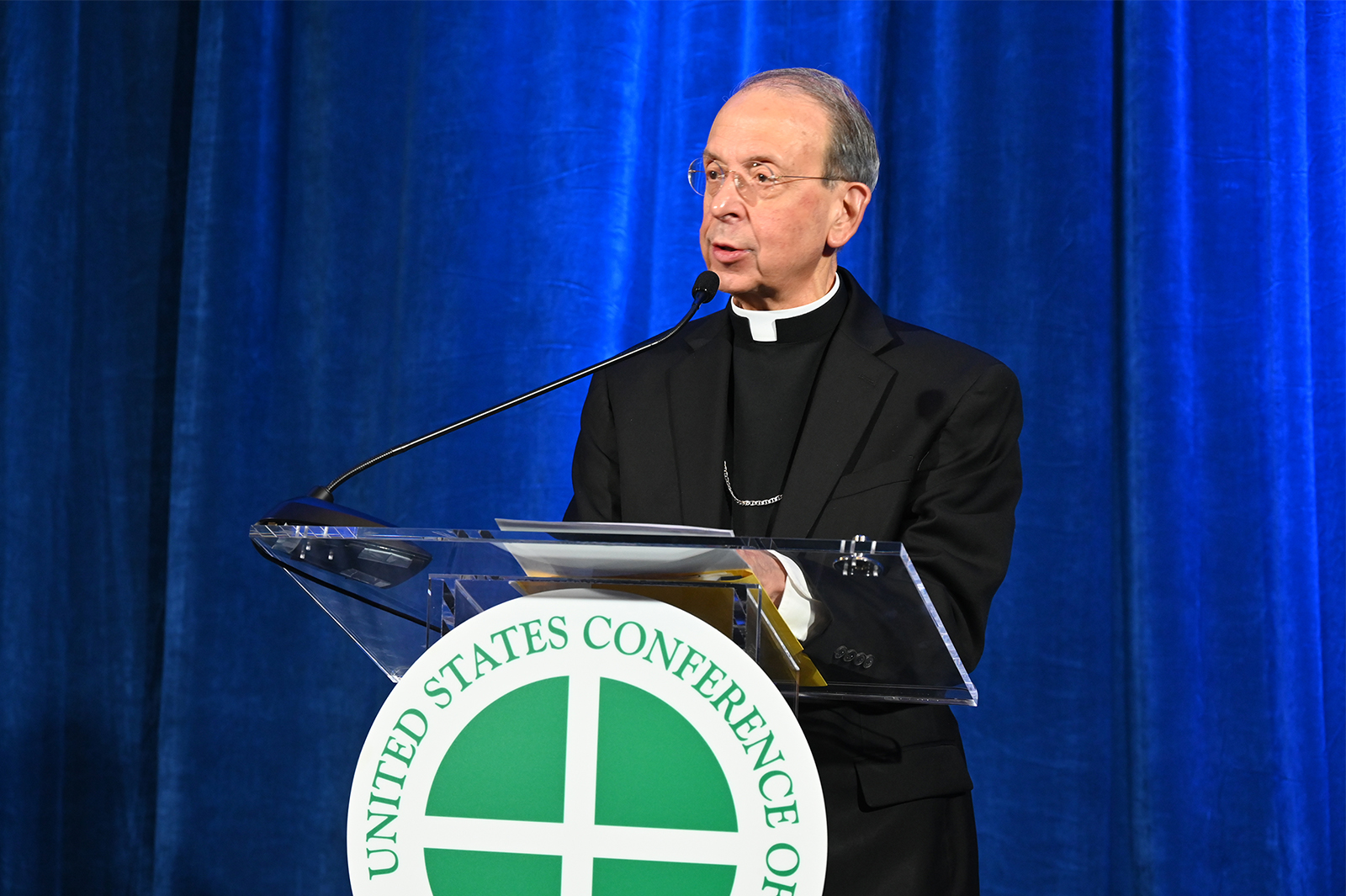
BALTIMORE (RNS) — Bishops at this year’s annual fall gathering of the U.S. Conference of Catholic Bishops struck a more even tone than at past gatherings, with prelates overseeing a less dramatic affair despite perceived tensions with Pope Francis and controversies involving the recent removal of a Texas bishop.
The four-day conference includes two days of public sessions, bookended by private meetings and worship services. The public portion kicked off Tuesday (Nov. 14) with customary remarks from Cardinal Christophe Pierre, the Vatican’s U.S. ambassador, who called on bishops to offer a unified front to the American people amid political polarization.
“While many secular leaders seem almost incapable of listening to each other and discerning a better way forward, we as Catholic bishops have something better to offer people: the hope and trust that come from being the sons and daughters of God,” Pierre said.
He was followed by USCCB President Archbishop Timothy P. Broglio of the U.S. Archdiocese of the Military Services, who drew attention to plights facing Catholics and others around the world — including the ongoing violence in the Middle East.
“Our thoughts turn readily to the Holy Land, sacred to all three monotheistic religions,” Broglio said. “We recognize and defend the right of Israel to exist and to enjoy a place among the nations. At the same time we know that the Palestinians, who represent the majority of Christians in the Holy Land — while still being a minority — have a right to a land that is their own. The Holy See has long advocated for that right and we also plead for them.”

USCCB President Archbishop Timothy P. Broglio, center, presides over the annual fall gathering of the U.S. Conference of Catholic Bishops, Nov. 15, 2023, in Baltimore. (RNS photo/Jack Jenkins)
What followed was a conference filled with straightforward procedural votes, such as appointing bishops to various committees, voicing support for an effort to make John Henry Newman — who was canonized as a saint in 2019 — a Doctor of the Church and shifting the regional classifications of the Archdiocese of Las Vegas and the Diocese of Reno.
It was a largely subdued affair compared with recent years, when bishops wrangled with hot-button issues such as a Eucharistic document that was seen as a proxy debate over whether to grant Communion to Catholic politicians who support abortion rights.
The lack of drama belied the weekend’s controversy that preceded the gathering. On Saturday, Pope Francis removed Bishop Joseph Strickland, a firebrand conservative cleric, from his post as head of the Diocese of Tyler, Texas. His departure followed a private dressing-down of Strickland by Pierre at the 2021 bishops’ gathering and a formal Vatican investigation of the Texas bishop’s diocese earlier this summer.
While Strickland was technically able to attend the conference, he appeared only at events conducted outside the Baltimore hotel, telling reporters Pierre had asked him to stay away.
“Maybe it was the right decision. … I respected it,” Strickland said of his absence.
Inside, there were hints of political fights to come. The bishops approved a measure involving the USCCB’s “Faithful Citizenship” document, an issue-based voting guideline distributed during election years. Prelates overwhelmingly voted to include bulletin inserts and a new introductory letter for the document, which, among other things, declares that the “threat of abortion remains our pre-eminent priority.”
Some criticized the document for placing a particular priority on abortion compared with other issues, such as the threat of global climate change. Bishop John Stowe, who oversees the Diocese of Lexington, Kentucky, lamented that climate change received “nowhere near the emphasis it should” in the document.
Stowe said he found the treatment of climate change especially galling given that last month Pope Francis published “Laudate Deum,” an update to his 2015 encyclical on the environment. In his new letter, the pontiff declared climate change to be “one of the principal challenges facing society and the global community,” and he singled out the United States as a nation where emissions per individual are especially high.
“The fact that we can’t even bring up the issues that are timely for this election, or the urgency of them — it’s baffling,” Stowe told Religion News Service.
Asked during a news conference about concerns regarding the treatment of climate change in the document, Baltimore Archbishop William Lori, who oversaw the working group that crafted the new materials, noted that bishops overwhelmingly approved the measure on Wednesday, with 225 voting in favor and only 11 voting no (seven abstained).
He then explained that the reason bishops so prioritize “the unborn as we do is because they are utterly voiceless and defenseless and abortion is a direct taking of human life.”

Baltimore Archbishop William Lori speaks to the media during the annual fall meeting of the U.S. Conference of Catholic Bishops, Nov. 15, 2023, in Baltimore. (RNS photo/Jack Jenkins)
Those involved view climate change differently, he said.
“The effects of this are indirect rather than direct,” he said, referring to climate change. “That does not make them less serious. It, however, does affect how we have weighed in things.”
The gathering was also the first USCCB meeting since Pope Francis convened the Synod on Synodality at the Vatican in October, the seminal event in an ongoing multiyear process instituted by the pontiff. The summit, which included both bishops and laypeople, was meant to mull the future of the church and reflect a vision rooted in communion and participation.
Participants who had attended the synod spoke warmly of it before the assembly, although some observers — including America Magazine, a Jesuit publication — noted that Pierre and Broglio appeared to disagree over how much work Catholics in the U.S. have to do to fully embrace synodality.
“The call to synodality, an essential means of spreading the gospel in today’s world, has also been working its way through the church,” Pierre said. He then cited the synod’s findings: “We have an important opportunity to reflect on the assembly’s questions and proposals in a ‘climate of mutual listening and sincere dialogue.'”
Broglio, by contrast, said the gathering helped him reflect on “the many synodal realities that already exist in the church in the United States.”
